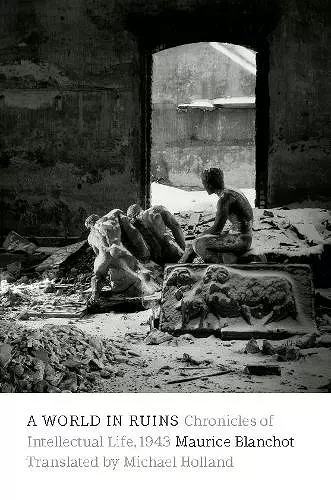A World in Ruins
Chronicles of Intellectual Life, 1943
Maurice Blanchot author Michael Holland translator
Format:Paperback
Publisher:Fordham University Press
Published:1st Feb '16
Should be back in stock very soon

In certain key respects, 1943 marked a turning point in the war. Increasingly, victory seemed assured. However, the backdrop to this gradually improving situation was one of widespread and unremitting destruction.
In the essays from that year, Blanchot writes from a position of almost total detachment from day-to-day events, now that all of his projects and involvements have come to naught. As he explores and promotes works of literature and ideas, he privileges those with the capacity to sustain a human perspective that does not merely contemplate ruin and disaster but sees them as the occasion for a radical revision of what “human” is capable of signifying.
Consigning all that the name “France” has hitherto meant to him to a past that is now in ruins, Blanchot begins to sketch out a counter-history that is international in nature, and whose human field is literature.
"Maurice Blanchot's writings during the Vichy years (1941-44) may be the most crucial of his long career, particularly when read against his controversial political writings of the 1930s. Although to all appearances occasional pieces, these literary essays and reviews are also projects of self-transformation in which Blanchot becomes an increasingly distanced and even invisible observer of the disaster of Occupied France, as well as a writer whose critiques of the conventions of the novel look forward to his later experiments in fragmentary writing and the materializations of language." -- -Gerald L. Bruns University of Notre Dame "Writing from one world in ruins to another, Blanchot comes to us today to pose the question of what, if anything, deserves to survive the collapse of an established order of meaning. Through the richness and precision of Michael Holland's presentation of these texts, and the elegance and rigour of his translations, we meet with new understanding one of recent history's most stringent explorations of the possibilities and limitations of thought in the face of disaster. If the now-forgotten subjects of many of these essays might suggest that they have little to say to our present day, Holland helps us to see that nothing could be further from the truth. Blanchot is not writing to us, no doubt. But he is most certainly writing for us." -- -Martin Crowley Queens' College "...what makes Blanchot's critical essays so important is the depth of his engagement with writing as a concept and the experience of writing fiction that he brings to the task. An essential Blanchotian theme treated in this volume, as throughout his work, is the ambiguity of literary language. Blanchot conceives of literature as having a unique power to put language itself in question, exposing the reader or writer to what lies beyond meaning, knowledge, and all familiar relations... Holland has rendered readers a service by stressing the importance of historical context in interpreting Blanchot's writings, and by extension 20th-century French thought, more generally." -- -Calum Watt Review 31 / Kings College "How did Maurice Blanchot transform himself from journeyman reviewer to the theorist of narrative whose work transformed the intellectual landscape of the postwar era? This collection of reviews from a single, harrowing year, 1943, provides answers. Expertly introduced, annotated, and translated by leading Blanchot scholar Michael Holland, A World in Ruins provides a unique entry into making of literature under Nazi occupation." -- -Alice Kaplan Yale University
ISBN: 9780823267262
Dimensions: unknown
Weight: unknown
320 pages